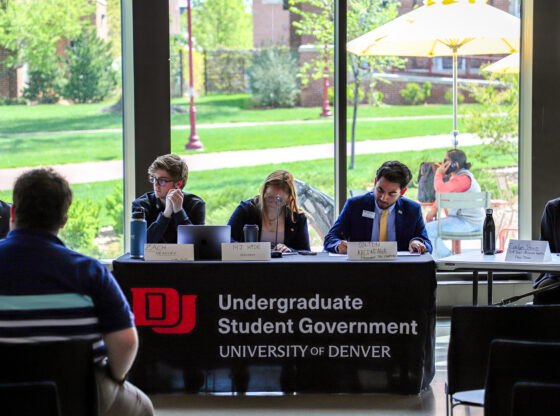 Photo by:
Photo by:
Colorado’s education system could see a major overhaul, thanks to a lawsuit brought by a DU student against the state.
Taylor Lobato, a DU strategic communication major, along with Children’s Voices, a non-profit, sued Colorado for not providing a “thorough and uniform” education system like Colorado’s constitution mandates. In late December Sheila Rappaport, a District Court Judge, ruled that the state’s education system could be underfunded by over $4 billion per year. Governor John Hickenlooper and the Colorado State Board of Education are appealing the case to the Colorado State Supreme Court. If the case is upheld, the lawsuit would become one of the most important cases in Colorado’s history.
If the Colorado Supreme Court sides with Lobato, the potential for change is nearly endless. The mandating of a higher percentage of the budget going to education, to mandating a certain amount that must be spent per pupil, which could be accompanied by the repeal or modification of TABOR, an amendment to Colorado’s constitution passed in 1992 that bans the increase of taxes, are all potentialities. The ability for the Colorado Supreme Court to create policies is an unsettling ground for the judicial system, especially one to do with such a contentious issue.
“This is a call to the legislator and to the people because I don’t know how to fix it, but I am proud to represent the students of Colorado,” said Lobato.
Six years ago, Taylor Lobato attended a high school in Center, Colo., in the Center School District, a rural portion of Colorado where over 80 percent of the students qualify for free lunches. Children’s Voices asked members of Lobato’s family if they would like to be the lead plaintiffs in a suit against the State of Colorado. Taylor’s family agreed, citing the deplorable situation at their kids’ schools.
“There were not enough math classes, no AP classes and the school could not afford the technology needed,” said Lobato, “[There were] not enough textbooks, and many were outdated.”
When the lawsuit first came to the district court, the judge threw out the case. The plaintiffs appealed to the Colorado Supreme Court, which directed the lower court to hear the case.
In August 2011, Lobato told her story to the district court. She said Center could not compete with other Colorado schools because of its underfunding and said she believes she did not receive a “thorough or uniform” education.
“I don’t believe I received the education Colorado’s constitution demands,” said Lobato.
Since the adoption of the Colorado constitution on Aug. 1 1876, Article IX, Section 2 mandates the state deliver a “thorough and uniform system of free public schools throughout the state, wherein all residents of the state, between the ages of 6 and 21 years, may be educated gratuitously.”
Taylor said the town of Center did not receive enough money from the State to provide an education, and the school itself was not fully responsible, either. Rather, she said the state was imprudent with providing the necessary funding.
“The school did the best it could with the funds,” said Lobato.
District Court Judge Sheila Rappaport wrote a 189-page ruling, which said Colorado’s education system is underfunded by between $1.35 billion-$4.15 billion. Colorado’s total budget for education in fiscal year 2011 was a little over $3 billion. Governor Hickenlooper quickly instructed the Colorado State Board of Education to appeal the decision, and they approved it by 4-3 vote.
“The taxpayers of Colorado are very generous to our schools,” said state board chairman Bob Schaffer to the Denver Post.
The plaintiffs disagree. They cite key statistics found by the national magazine Education Week, which ranks Colorado 40th in the nation between North Carolina and Mississippi in per-pupil spending. They also said Colorado’s spending per-pupil is nearly $2,000 less per year than the national average and $7,500 less per year than Wyoming. The suit also claims that the key provision in the Constitution, “uniform,” is not being met either.
“Just throwing money isn’t going to fix it,” said Lobato. “The actual system needs to be reformed.”
The case will next be heard by the Colorado Supreme Court when they decide on a final date. Justice Monica Marquez will most likely recuse herself due to her previous work against the case as Deputy Attorney General. With her recusal, there is a possibility of a split between the Court, and if that happens, the tie goes to the runner, Taylor Lobato and Children’s Voices.










